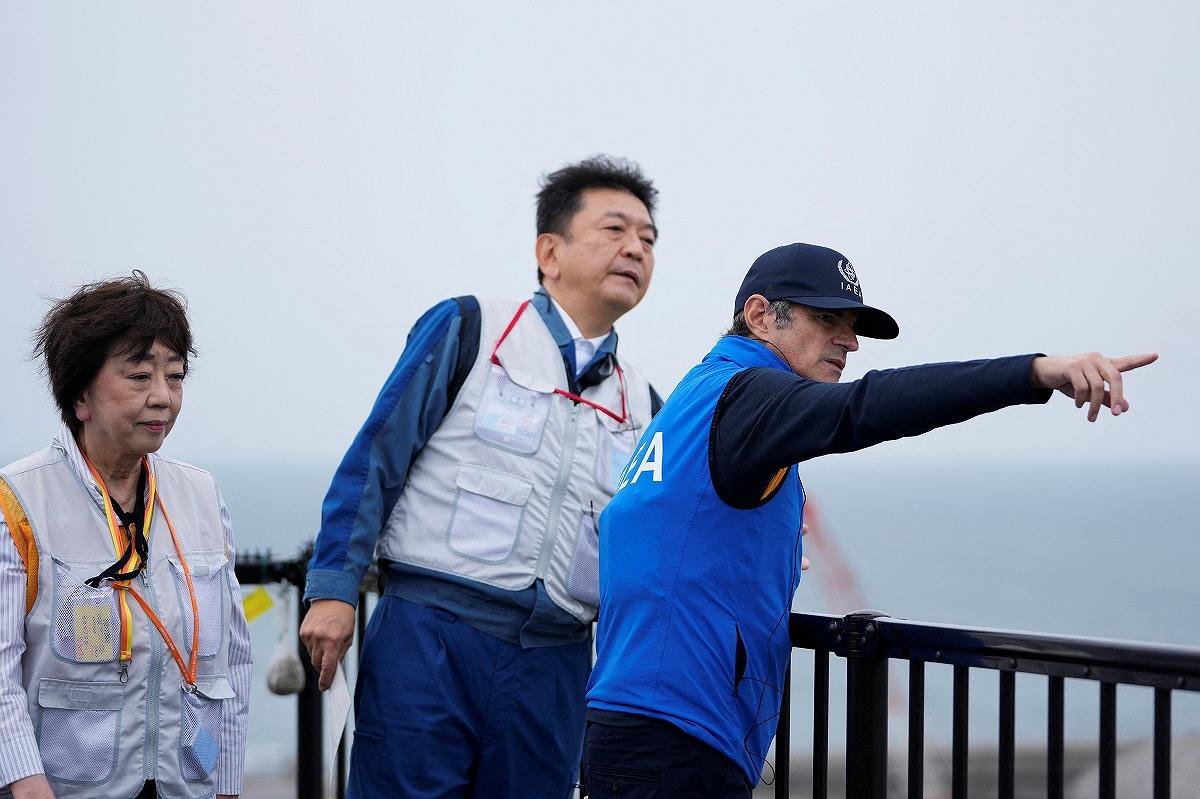- Political Series
- Future World Order
International Organizations / Prevalence of Disinformation Has Japan Fighting Back

Rafael Mariano Grossi, Director General of the International Atomic Energy Agency, right, listens to Tomoaki Kobayakawa, President of Tokyo Electric Power Co., explain facilities used to release treated wastewater, while visiting the damaged Fukushima nuclear power plant in Futaba, Fukushima Prefecture on July 5.
20:00 JST, July 19, 2023
This is the third installment of a series examining how international organizations are at a critical juncture due to changes in the global situation.
***
At around noon on June 22, a disinformation response team established last year by the Foreign Ministry addressed spurious information disseminated on YouTube.
The team was responding to a report issued by South Korean online media claiming that a senior Japanese Foreign Ministry official had made a political donation of more than €1 million (around ¥155 million) to the International Atomic Energy Agency.
The IAEA was in the process of preparing a report assessing the safety of Japan’s plans to discharge into the sea treated water from the Fukushima No.1 nuclear power plant, which is being decommissioned by Tokyo Electric Power Company Holdings, Inc.
The Foreign Ministry acted quickly to deal with the disinformation, issuing a Japanese-language statement just before 5 p.m., followed by an English-language statement just after 8:30 p.m. saying the “report has no basis in fact.”
Some ministry officials, however, also expressed caution over such statements.
“If we address the report, it could cause the disinformation to spread further,” one such person said.
The ministry decided to counter the claim, noting that it was a form of information warfare aimed at undermining the IAEA’s credibility.
The IAEA was established in 1957 as a specialized agency of the United Nations to promote the peaceful use of nuclear energy. At the request of the Japanese government, the IAEA inspected the plans to release treated water from the Fukushima No. 1 nuclear power plant.
On July 4 the report released concluded that Japan’s plans were “consistent with relevant international safety standards.”
China, through its Ambassador to Japan Wu Jianghao, criticized the IAEA, saying the agency “is not an appropriate party for assessing long-term effects of nuclear-contaminated water on the marine environment and biological health.”
Tokyo continues to be increasingly skeptical of Beijing’s stance.
“I wonder if China believes it can wield authority over an international organization by putting pressure on it,” a Japanese government official said.
Beijing has done so before with another U.N.-related entity, the World Health Organization. China was allowed to interfere with a survey conducted in Wuhan on the origin of the novel coronavirus by having a Chinese expert coauthor the report.
Following this successful intervention, the view persists that China tried to do the same thing with the IAEA. According to sources, Beijing has strongly exerted pressure on the agency.
Since the end of World War II, Japan has been a staunch advocate of a U.N.-centered international system, which puts priority on the impartiality and neutrality of international organizations.
Losing ground
Even so, Japan has lost ground at the United Nations regarding information warfare in which neighboring states have called Japanese historical issues into question.
In Nagasaki on what is commonly known as Gunkanjima for its battleship-like shape is the Hashima Coal Mine, which was registered in 2015 as part of the UNESCO World Heritage called Sites of Japan’s Meiji Industrial Revolution.
Six years later, UNESCO adopted a resolution saying Japan’s explanation on workers from the Korean Peninsula was insufficient. The U.N. body’s stance is thought to have been partly due to campaigns by South Korean entities.
“It’s necessary to develop human resources who can use data to counter arguments relating to history,” said Koko Kato, managing director of the Industrial Heritage Information Centre, which deals with the labor situation related to Gunkanjima.
Major Western countries have experts that can deal with historical matters.
“We need to enhance our ability to deal with history-related issues,” a senior Japanese government official said. “We can do this by cooperating with the private sector to increase necessary human resources and dispatch them to international organizations, where historical issues can easily become points of contention.”
Information warfare has increased in importance following incidents related to the 2016 U.S. presidential election and Russia’s invasion of Ukraine. Nations around the world continue to accelerate efforts to adopt countermeasures.
Top Articles in Politics
-

Japan PM Takaichi’s Cabinet Resigns en Masse
-

Sanae Takaichi Elected Prime Minister of Japan; Keeps All Cabinet Appointees from Previous Term
-

Japan’s Govt to Submit Road Map for Growth Strategy in March, PM Takaichi to Announce in Upcoming Policy Speech
-

LDP Wins Historic Landslide Victory
-

LDP Wins Landslide Victory, Secures Single-party Majority; Ruling Coalition with JIP Poised to Secure Over 300 seats (UPDATE 1)
JN ACCESS RANKING
-

Japan PM Takaichi’s Cabinet Resigns en Masse
-

Japan Institute to Use Domestic Commercial Optical Lattice Clock to Set Japan Standard Time
-

Israeli Ambassador to Japan Speaks about Japan’s Role in the Reconstruction of Gaza
-

Man Infected with Measles Reportedly Dined at Restaurant in Tokyo Station
-

Videos Plagiarized, Reposted with False Subtitles Claiming ‘Ryukyu Belongs to China’; Anti-China False Information Also Posted in Japan






















